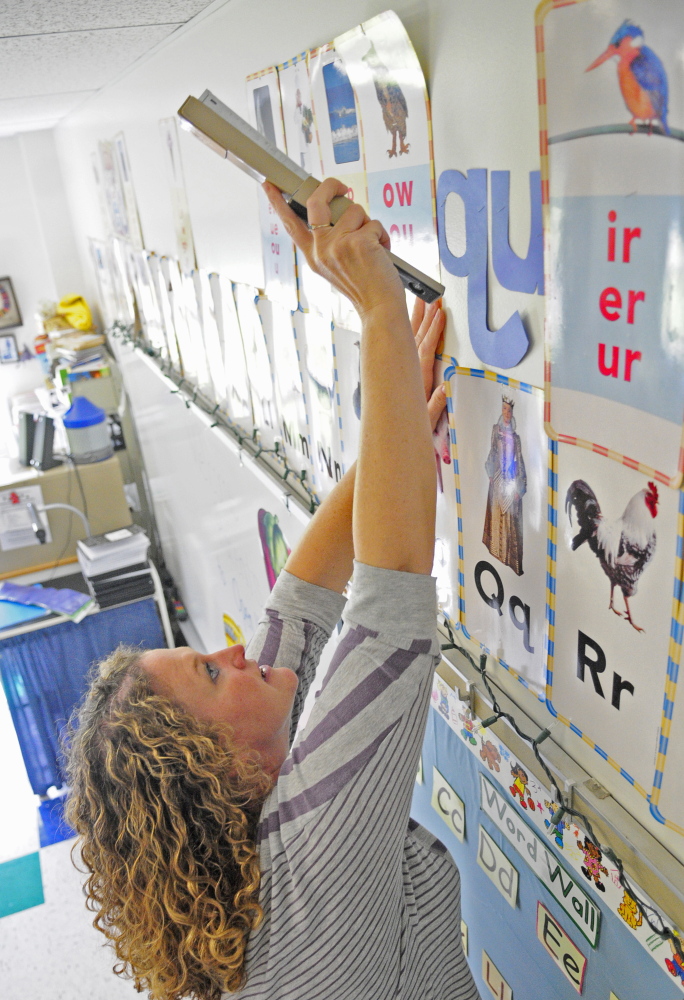AUGUSTA — New report cards that use the numbers one through four instead of letters or a more traditional numerical system to indicate student performance could come to the city’s public elementary schools.
The new report cards for grades kindergarten to six would replace the current system of reporting individual student performance using a combination of the letters E, M, P, and N and, in grades four through six, numerical grades such as 60s, 70s, 80s, and 90s.
Donna Madore, assistant superintendent, said Augusta first tried updating its report cards in kindergarten to grade six in 2008. A new method of grading students based upon how they met standards in multiple areas was implemented in kindergarten to grade three in 2008. But school officials, following some criticism from parents, adopted a dual grade reporting system for grades four to six that includes both the level to which they met standards in each skill area and a numerical grade, such as a 70.
“Numerical grades, that’s what people are used to. It’s what they experienced in school,” Madore said. “There was some push-back (in 2008). Some families didn’t really want (to change from) that. So in grades four to six, there has been dual reporting, saying whether each student meets or exceeds standards, and also giving a number grade, to make everyone happy. Now we’re looking at going completely standards-based, K through six. It’s time.”
Under the new proposal students would be graded on how they master a number of skills in each subject area included on the report cards on a scale from one to four with four being the highest grade and one the lowest.
The proposed new system goes to the Augusta Board of Education for approval at a meeting starting at 7 p.m. Wednesday in council chambers at Augusta City Center.
Implementation of the new reporting methods is tied to the recent implementation of state legislation in 2013 that mandated Maine schools convert to proficiency-based diploma standards. Those standards generally seek to measure and report what students have picked up and can demonstrate for skills in each subject area rather than their performance on class assignments such as homework or class participation.
The one-to-four grading system would take the place of the current, four-letter system of E, for exceeds standards, M for meets standards, P for partially meets standards and N for needs more time to meet standards.
The school system’s current kindergarten to grade six report cards, officials noted, also don’t line up with the curriculum that is based on mandated Maine Learning Results and Common Core standards. The new system would better line up with those standards. Madore said Augusta has aligned its curriculum to those standards already, but until now has not yet aligned its grade reporting system with them.
Madore said Augusta, if the school board approves the new report cards, would begin using them with the first trimester reporting period next school year.
She said the school system will hold open houses where teachers will explain the expectations to parents. Forums will also likely be held at each elementary school to help inform parents about the new report cards and written information will also be made available to them.
The school board’s Curriculum and Education Committee voted 2-0 to forward the proposal to implement the new proficiency-based report cards to the full board for a vote.
Madore said the current, more traditional numerical grading system will remain in place, at least for now, for middle and high school students.
Board members at their Wednesday meeting are also scheduled to:
• consider approving a new art class at Cony High School, photographic vision and digital discovery, in a partnership with University of Maine at Augusta. The class would be taught in part by a UMA professor, which officials said would mean the local school system would not need to fund additional staff for the class. Students who successfully take the class would get both a high school credit and three college credits at UMA;
• consider approving a formal plan for teaching students for whom English is not their primary language;
• consider adopting or modifying several school system policies.
Keith Edwards — 621-5647
kedwards@centralmaine.com
Twitter: @kedwardskj
Send questions/comments to the editors.



